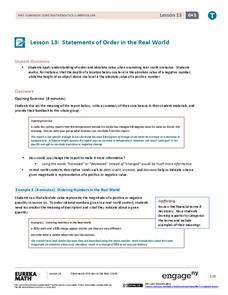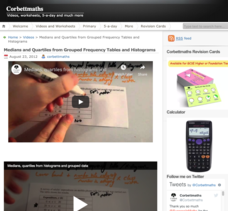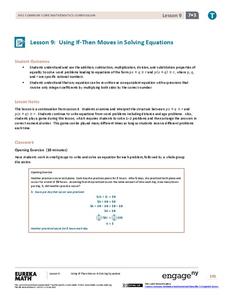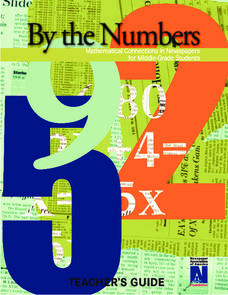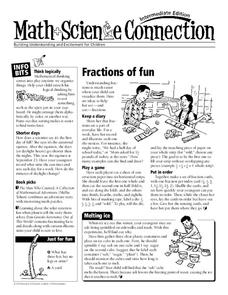Curated OER
Alice in Fractalland
Take your class on a field trip to Fractalland where they'll learn all about number and shape patterns. Based on Disney's movie Alice in Wonderland, this resource takes young mathematicians on an adventure as they explore patterns in...
Granite School District
Kindergarten CCSS Math Vocabulary Word List
Help kindergartners develop the academic language they need to master the Common Core standards with this list of math vocabulary. Including the definitions of each term as well as a set of word cards with supporting images and examples,...
EngageNY
Grade 5 Math Module 1, Topic A, Lesson 1
Extend the place value system. The first lesson plan in a series of 18 extends the place value system to millions through thousandths. Using place value charts, pupils see how the value of a digit changes as it moves places. Teachers use...
EngageNY
Grade 5 Math Module 1, Topic C, Lesson 8
Go another round on rounding. Pupils refine their learned rounding skills in the eighth installment in an 18-part unit on decimals. The instructional activity takes away some of the previous scaffolding to encourage scholars to use the...
Curriculum Corner
“I Can” Common Core! 3rd Grade Math
Help third graders make sense of the Common Core math standards with this simple checklist. By rewording each standard as an I can statement, children are provided with clear goals to focus on as they participate in math lessons.
CK-12 Foundation
Mixed Numbers in Applications: Sharing a Chocolate Bar
The advantage of a virtual chocolate bar: it never melts. Learners use an interactive to share a chocolate bar among friends. Some challenge questions assess understanding of fractions in relation to this context.
EngageNY
Statements of Order in the Real World
Positive and negative numbers are all around us. Groups read short story contexts and identify a rational number that represents the values in the context. They order the rational numbers and interpret statements of inequality.
Corbett Maths
Medians and Quartiles from Grouped Frequency Tables and Histograms
Determine medians within a group. Given data represented as a frequency table of grouped data, the video demonstrates finding an estimation for the median. After finding the group where the median resides, the presenter uses a formula to...
EngageNY
Summarizing Bivariate Categorical Data in a Two-Way Table
Be sure to look both ways when making a two-way table. In the lesson, scholars learn to create two-way tables to display bivariate data. They calculate relative frequencies to answer questions of interest in the 14th part of the series.
EngageNY
Using If-Then Moves in Solving Equations II
Continuing from the previous lesson in the 28-part series, learners write equations to model problem situations. They then solve the problem by applying the properties of equality. In contrast to the previous lesson, they do not write...
US Department of Commerce
Changes in My State
So much can change in seven years. Young statisticians choose three types of businesses, such as toy stores and amusement parks, and use census data to determine how the number of those businesses in their state changed between 2010 to...
Newspaper Association of America
By the Numbers: Mathematical Connections in Newspapers for Middle-Grade Students
A cross-curricular resource teaches and reinforces mathematical concepts with several activities that use parts of a newspaper. Scholars use scavenger hunts to find the different ways math is used in the paper along with using data...
Math Solutions
Dr. Seuss Comes to Middle School Math Class
If you think Dr. Seuss has no place in a math classroom, then take a look at this resource. Based on the classic children's book Green Eggs and Ham, this sequence of activities engages children learning to model real-world contexts...
Curated OER
Patterns in the Multiplication Table
Explore patterns in the multiplication table in order to deepen your third graders' understanding of this essential skill. Implement this activity as a whole-class lesson, allowing students to work in pairs or small groups to support...
Mathed Up!
Angles in Triangles and Quadrilaterals
This short video show viewers how to connect the sum of the angles in a triangle to other angle measurements. Pupils determine the missing measures for angles involved with triangles and quadrilaterals. Class members then must explain...
Federal Reserve Bank
Invest in Yourself
What are the different ways that people can invest in their human capital for a better future? Pupils participate in an engaging hands-on activity and analyze data regarding unemployment, the ability to obtain an education, and median...
Fluence Learning
Writing About Literature: Comparing and Contrasting Characters in Heidi
Scholars read excerpts from the story, Heidi, in a three-part assessment that focuses on comparing and contrasting characters. Each part contains three tasks that challenge learners to discuss, answer comprehension...
Bob Prior
The Order of Operations
Your learners use many different number representations like positive and negative integers, exponents, radicals, and combinations of operations as they learn and strengthen their use of the order of operations. Thoughtfully organized to...
Resources for Educators
Fractions of Fun
Reinforce concepts and encourage learner engagement with a collection of math games, science experiments, and cross curricular activities. In one fun resource, learners sort objects, keep a diary of everyday fractions, play a game using...
Rice University
Elementary Algebra
Find all the Algebra 1 content in one location. A helpful eBook contains the content typically found in an Algebra 1 course. Concepts range from solving and graphing linear equations to solving and graphing quadratic equations....
EngageNY
Read Expressions in Which Letters Stand for Numbers III
Those key operation words sure come in handy. Groups continue their work with converting between different notations for algebraic expressions. They work in stations to write the symbolic form for given verbal phrases. This is the 17th...
Curated OER
Using Random Sampling to Draw Inferences
Emerging statisticians develop the ability to make inferences from sample data while also working on proportional relationships in general. Here, young learners examine samples for bias, and then use random samples to make...
BW Walch
Solving Systems of Linear Inequalities
One thing that puzzles a lot of young algebrists is the factors in a word problem that are taken as "understood". This presentation on solving systems of linear inequalities does a great job walking the learner through how to tease those...
PBS
Scale City — Proportional Relationships in the Real World
Strive to determine your stride. Scholars first view an informative video on the Kentucky Horse Park and the 28-feet stride of the Man o' War. They then work together in groups to find the length of their own strides by using the number...






